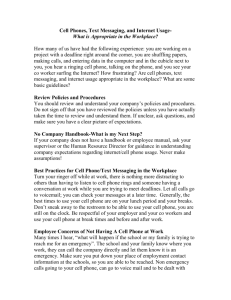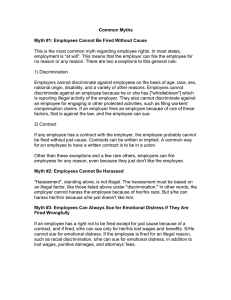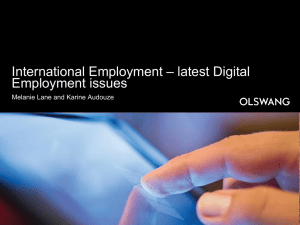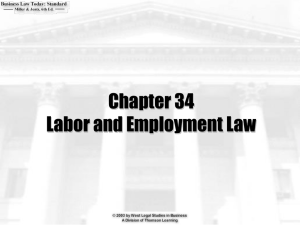Moral Issues in Business
advertisement
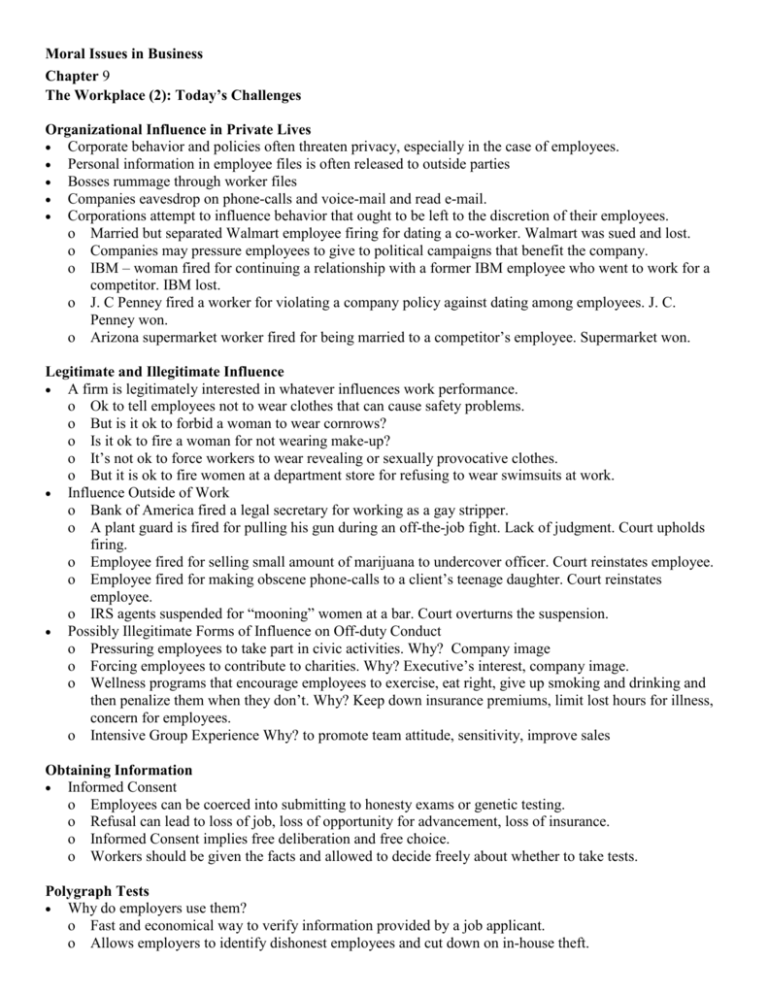
Moral Issues in Business Chapter 9 The Workplace (2): Today’s Challenges Organizational Influence in Private Lives • Corporate behavior and policies often threaten privacy, especially in the case of employees. • Personal information in employee files is often released to outside parties • Bosses rummage through worker files • Companies eavesdrop on phone-calls and voice-mail and read e-mail. • Corporations attempt to influence behavior that ought to be left to the discretion of their employees. o Married but separated Walmart employee firing for dating a co-worker. Walmart was sued and lost. o Companies may pressure employees to give to political campaigns that benefit the company. o IBM – woman fired for continuing a relationship with a former IBM employee who went to work for a competitor. IBM lost. o J. C Penney fired a worker for violating a company policy against dating among employees. J. C. Penney won. o Arizona supermarket worker fired for being married to a competitor’s employee. Supermarket won. Legitimate and Illegitimate Influence A firm is legitimately interested in whatever influences work performance. o Ok to tell employees not to wear clothes that can cause safety problems. o But is it ok to forbid a woman to wear cornrows? o Is it ok to fire a woman for not wearing make-up? o It’s not ok to force workers to wear revealing or sexually provocative clothes. o But it is ok to fire women at a department store for refusing to wear swimsuits at work. • Influence Outside of Work o Bank of America fired a legal secretary for working as a gay stripper. o A plant guard is fired for pulling his gun during an off-the-job fight. Lack of judgment. Court upholds firing. o Employee fired for selling small amount of marijuana to undercover officer. Court reinstates employee. o Employee fired for making obscene phone-calls to a client’s teenage daughter. Court reinstates employee. o IRS agents suspended for “mooning” women at a bar. Court overturns the suspension. • Possibly Illegitimate Forms of Influence on Off-duty Conduct o Pressuring employees to take part in civic activities. Why? Company image o Forcing employees to contribute to charities. Why? Executive’s interest, company image. o Wellness programs that encourage employees to exercise, eat right, give up smoking and drinking and then penalize them when they don’t. Why? Keep down insurance premiums, limit lost hours for illness, concern for employees. o Intensive Group Experience Why? to promote team attitude, sensitivity, improve sales • Obtaining Information Informed Consent o Employees can be coerced into submitting to honesty exams or genetic testing. o Refusal can lead to loss of job, loss of opportunity for advancement, loss of insurance. o Informed Consent implies free deliberation and free choice. o Workers should be given the facts and allowed to decide freely about whether to take tests. • Polygraph Tests • Why do employers use them? o Fast and economical way to verify information provided by a job applicant. o Allows employers to identify dishonest employees and cut down on in-house theft. • • Questionable Assumptions about Polygraph Tests o Lying triggers an involuntary, distinctive response. o No. They show when a person is disturbed by a question, but not whether he is lying. o Polygraphs are extremely accurate o No. In an experiment, qualified operators were accurate less than 65% of the time. o Polygraphs cannot be beaten. o Psychiatrist David Lykken believes that people can be trained to beat the system. Three Points for Employers to Consider about Polygraph Tests o Information sought should be job-related. o Since polygraphs are invasive, they should not be used routinely. o Results should be kept private and disposed of when no longer needed. Personality Tests • Useful Purposes o Help screen applicants for jobs by indicating areas of adequacy and inadequacy. o Help determine whether a person can relate to others. • Problems o Tests may oversimplify human nature and potential. o Tests may overemphasize conformity over creativity. o Tests ask extremely intrusive questions. o Testing companies may be marketing invalid or unreliable tests. Saroka V. Dayton Hudson • A class action invasion-of-privacy and employment discrimination lawsuit was filed in 1989. The lawsuit was filed on behalf of security applicants at Target’s 113 California stores. The plaintiff applied for a security guard position with Target Stores and was required to take two standard psychological tests. The plaintiff contended that the test questions probed into his private thoughts and deepest feelings and were not job related. The court agreed that the some of the test questions did indeed invade the applicants’ privacy because they asked about religious beliefs and sexual preferences. Among the true/false questions were: o I believe my sins are unpardonable. o I am very attracted to members of my own sex. o Evil spirits possess me sometimes. o I have no difficulty starting or holding my bowel movement. o My sex life is satisfactory. o I have never been in trouble because of my sexual behavior. o I feel sure there is only one true religion. o I go to church almost every week. • Target needed to show some compelling reasons for the invasion of privacy and demonstrate that the test served a job related purpose to justify that invasion of privacy. While the court acknowledged that Target had an interest in employing emotionally stable persons as security officers, Target did not show how information pertaining to an applicant’s sexual preferences or religious beliefs would have any bearing on emotional stability. Therefore the questions were deemed as not being job-related. Target settled the lawsuit for over $2 million without admitting wrongdoing or liability. Employee Monitoring: Is There Privacy in the Workplace? • Employers want to be sure their employees are doing a good job, but employees don’t want their every sneeze or trip to the water cooler logged. That’s the essential conflict of workplace monitoring. • New technologies make it possible for employers to monitor many aspects of their employees’ jobs, especially on telephones, computer terminals, through electronic and voice mail, and when employees are using the Internet. Such monitoring is virtually unregulated. Therefore, unless company policy specifically states otherwise (and even this is not assured), your employer may listen, watch and read most of your workplace communications. o Can my employer listen to my phone calls at work? In most instances, yes. For example, employers may monitor calls with clients or customers for reasons of quality control. However, when the parties to the call are all in California, state law requires that they be informed that the conversation is recorded or monitored by either putting a beep tone on the line or playing a recorded message. An important exception is made for personal calls. Under federal case law, when an employer realizes the call is personal, he or she must immediately stop monitoring the call. However, when employees are told not to make personal calls from specified business phones, the employee then takes the risk that calls on those phones may be monitored. o Is my employer allowed to see what is on my terminal while I am working? Generally, yes. Since the employer owns the computer network and the terminals, he or she is free to use them to monitor employees. Employees are given some protection from computer and other forms of electronic monitoring under certain circumstances. Union contracts, for example, may limit the employer’s right to monitor. Also, public sector employees may have some minimal rights under the United States Constitution, in particular the Fourth Amendment which safeguards against unreasonable search and seizure. There may be some additional rights for employees in California given specific statutes of that state. o Is electronic mail private? What about voice mail? In most cases, no. If an electronic mail (e-mail) system is used at a company, the employer owns it and is allowed to review its contents. Messages sent within the company as well as those that are sent from your terminal to another company or from another company to you can be subject to monitoring by your employer. The same holds true for voice mail systems. Several workplace privacy court cases have been decided in the employer’s favor. Drug Testing – Points to Consider • Excessive media attention and political posturing can create a false sense of crisis, leading people perhaps to advocate extreme or unnecessary measures. • To go on a fishing trip in search of possible employee drug abuse, when there is no evidence of a problem or significant danger, seems unreasonable. • Drug abuse calls for medical and psychological assistance rather than punitive action. • Drug-testing programs should be careful to respect the dignity and rights of the persons to be tested.
